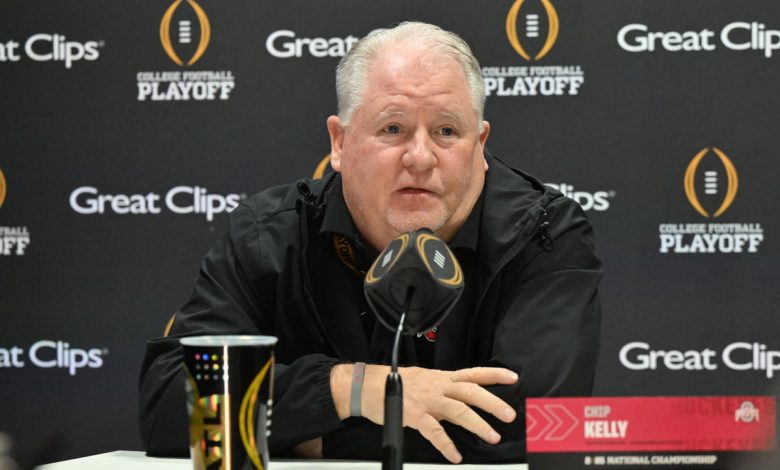Football: Offensive coordinator Chip Kelly reportedly leaving Buckeyes for NFL

The football world has always been a dynamic and fast-paced environment, with coaches constantly moving between programs and leagues, seeking new opportunities to grow their careers. One of the more surprising recent developments in college football has been the news that offensive coordinator Chip Kelly is reportedly leaving his position at Ohio State University (OSU) to make a return to the NFL. Kelly’s decision to move back to the professional ranks is bound to have significant repercussions for both the Buckeyes and the NFL, as it raises questions about what motivated him to make the jump, what impact it will have on the Ohio State program, and how he might fare in his second stint in the NFL.
Chip Kelly’s Career in College Football
Chip Kelly is a name synonymous with offensive innovation in college football. He first gained national attention during his time as the head coach of the Oregon Ducks from 2009 to 2012. Under Kelly, Oregon became one of the most electrifying teams in college football, known for its high-paced, no-huddle offense that utilized speed, tempo, and spacing to overwhelm opposing defenses. Kelly’s “blur offense” was revolutionary, and it helped reshape the landscape of college football, as teams across the country began to adopt similar schemes.
Kelly’s success at Oregon—culminating in a BCS National Championship appearance in 2011—made him one of the most sought-after coaches in the country. His innovative approach to offense and his ability to get the best out of his players caught the attention of several NFL teams, ultimately leading to his hiring as the head coach of the Philadelphia Eagles in 2013.
While Kelly’s tenure with the Eagles started with a great deal of promise, including a 10-6 season in his first year, it ended with mixed results. His fast-paced offensive system did not translate as well to the NFL as it did in college, and despite some success, Kelly was fired after the 2015 season. However, Kelly’s time in the NFL was not without its learning moments, and he returned to the college ranks as head coach of the UCLA Bruins, where he attempted to rekindle the magic that made him a star at Oregon.
During his time at UCLA, Kelly’s impact was felt on offense, but his success in terms of overall program development was more mixed. Nevertheless, his ability to develop creative offensive schemes continued to be a defining aspect of his coaching philosophy. His work with quarterbacks, running backs, and wide receivers helped produce exciting and explosive offenses that were competitive in the highly regarded Pac-12.
Chip Kelly’s Impact at Ohio State
After his time at UCLA, Chip Kelly made a surprising return to the college football world when he was hired as the offensive coordinator at Ohio State. Kelly’s arrival at OSU was met with a great deal of excitement, as he was tasked with overseeing one of the most potent offenses in college football. Ohio State had already established itself as a powerhouse under head coach Ryan Day, and Kelly’s experience and reputation as an offensive innovator were expected to take the Buckeyes’ offense to new heights.
At Ohio State, Kelly was expected to bring a level of sophistication and versatility to the offense, particularly as the team looked to capitalize on its talented roster. Under Day’s leadership, the Buckeyes had already been one of the most potent offensive teams in college football, with quarterback CJ Stroud leading the charge and a plethora of playmakers surrounding him. Kelly’s addition to the coaching staff allowed Ohio State to expand its offensive playbook, adding wrinkles that kept defenses guessing. His emphasis on up-tempo play, creative formations, and exploiting mismatches gave the Buckeyes a distinct advantage in the Big Ten.
However, despite the promise of an explosive offensive attack, Kelly’s time at Ohio State was not entirely without challenges. Integrating his up-tempo style with a team that had already developed a solid offensive system was not without its growing pains. While Kelly was able to help elevate Ohio State’s offense to new levels of creativity, it took time for the team to fully mesh with his philosophies. There were questions about how well his system would integrate with Day’s overall coaching vision, and how well the offensive personnel would fit into Kelly’s high-paced offense.
Despite these challenges, Kelly’s impact on Ohio State’s offense was clear. The team’s ability to put up big numbers, both through the air and on the ground, was a testament to Kelly’s ability to adapt and evolve his offensive schemes. He helped develop Stroud into one of the top quarterbacks in the nation, further cementing his reputation as a coach capable of getting the best out of talented offensive players.
Kelly’s ability to identify and develop talent at the skill positions, particularly wide receivers and running backs, was evident as Ohio State continued to produce standout players. His work with the offensive line was also impressive, as Kelly was able to mold the group into a unit capable of creating the holes needed for a fast-paced, up-tempo offense to thrive.
Why the NFL?
After spending several years back in college football, Kelly’s decision to leave Ohio State and return to the NFL is one that raises many questions. Why would a coach who has already achieved so much in college football—particularly in terms of offensive innovation—decide to make the move back to the professional ranks?
One of the key factors in Kelly’s decision is likely the allure of the NFL. As much as college football offers excitement and the ability to build something from the ground up, the NFL offers a unique set of challenges and rewards. Coaching in the NFL provides an opportunity to work with some of the most talented athletes in the world, all while dealing with a highly competitive and well-resourced environment. For a coach like Kelly, who thrives on innovation and wants to prove himself in the most elite of environments, returning to the NFL provides an opportunity to test his systems and philosophies at the highest level.
Another motivating factor is likely the chance to work with NFL-level talent on a consistent basis. In college, Kelly often had to work with players who were still developing and learning the game, while in the NFL, the level of talent and experience is much higher. The opportunity to work with seasoned professionals—especially quarterbacks and wide receivers—may be incredibly appealing to Kelly, as it allows him to further refine his craft and take his offensive philosophies to a new level.
Additionally, the NFL offers a different set of challenges in terms of roster management, game-planning, and overall program building. As an offensive coordinator in the NFL, Kelly will have to adapt to different styles of defense and face off against some of the most experienced coaches in the world. The fast-paced nature of the NFL, with a focus on quick turnarounds and high-stakes games, will be an intriguing challenge for Kelly, who made a name for himself with his high-tempo offenses in college.
What Does This Mean for Ohio State?
While Kelly’s departure will undoubtedly have a significant impact on Ohio State, the Buckeyes program is built to withstand such losses. Head coach Ryan Day has a proven track record of developing top-tier talent and maintaining the success of his program, even as coaching staff members move on to new opportunities. Ohio State has long been a powerhouse in the Big Ten, and the recruiting pipeline, combined with Day’s leadership, will ensure that the team remains competitive.
However, Kelly’s absence will leave a notable void in the Buckeyes’ offensive coaching staff. As a highly respected offensive mind, Kelly brought an additional layer of creativity and innovation to Ohio State’s attack. His departure will likely force Day and his staff to reassess the direction of the offense and how best to continue pushing the program forward. Ohio State will have to quickly find a replacement who can match Kelly’s ability to develop talent and maintain the tempo-based offensive system that became a hallmark of their success.
Given the high expectations surrounding Ohio State, it’s clear that the program will look to maintain its position as one of the top teams in the country. The loss of Kelly may force some adjustments, but the core of the team remains strong, and Ohio State’s recruiting power will continue to attract elite talent to fill the gaps left by coaching changes.
What’s Next for Kelly?
As for Chip Kelly, his return to the NFL marks a fresh chapter in his coaching career. The move will allow him to apply the lessons he’s learned over his years in college football to a different type of challenge. The NFL offers a different level of scrutiny, with a greater emphasis on immediate results and performance. But for Kelly, this return presents an opportunity to prove that his unique offensive philosophies can still thrive at the highest level.
Whether he returns to a former NFL team, such as the Philadelphia Eagles or San Francisco 49ers, or joins a new franchise, Kelly will be looking to showcase his ability to innovate and revitalize an NFL offense. As teams continue to look for new ways to generate explosive offenses, Chip Kelly’s high-tempo approach and offensive creativity could be just the spark some NFL teams need.









